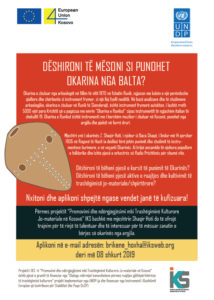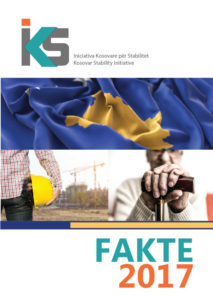Dëshironi të mësoni si punohet Okarina nga balta?

Okarina e zbuluar nga arkeologët në fillim të vitit 1970 në fshatin Runik, ngjason me kokën e një perëndeshe qiellore dhe shërbente si instrument frymor, si një lloj fyelli neolitik. Në bazë analizave dhe të studimeve arkeologjike, okarina e zbuluar në Runik të Skenderajt, është instrument frymorë autokton, i lashtë rreth 5000 vjet para Krishtit që u pagëzua me emrin “Okarina e Runikut” sipas instrumentit të ngjashëm italian të shekullit 19. Okarina e Runikut është instrumenti me i hershëm muzikor i zbuluar në Kosovë, punohet nga argjila dhe pjekët në furrë druri.
Mjeshtri ynë i okarinës Z. Shaqir Hoti, i njohur si Baca Shaqë, i lindur më 14 qershor 1936 në Rogovë të Hasit ia dedikoi tërë jetën punimit dhe studimit të instrumenteve burimore, e në veçanti Okarinës. Ai krijoi ansamble të njohura popullore e folklorike dhe ishte pjesë e orkestrës së Radio Prishtinës për shumë vite.
Dëshironi të bëheni pjesë e kursit të punimit të Okarinës?
Dëshironi të bëheni pjesë aktive e ruajtjes dhe kultivimit të trashëgimisë jo-materiale/shpirtërore?
Nxitoni dhe aplikoni shpejtë ngase vendet janë të kufizuara!
Përmes projektit “Promovimi dhe ndërgjegjësimi mbi Trashëgiminë Kulturore Jo-materiale në Kosovë” IKS bashkë me mjeshtrin Shaqir Hoti do të ofrojë trajnim për të rinjë të talentuar dhe të interesuar për të mësuar zanatin e bërjes së okarinës nga argjila.
Aplikoni në e-mail adresën: brikene_hoxha@iksweb.org deri më 08 shkurt 2019
Projekti i IKS -it “Promovimi dhe ndërgjegjësimi mbi Trashëgiminë Kulturore Jo-materiale në Kosovë“ është pjesë e grantit financiar nga “Dialogu ndërmjet komuniteteve përmes ruajtjes gjithëpërfshirëse të trashëgimisë kulturore” projekt implementuar nga UNDP-ja dhe financuar nga Instrumenti i Bashkimit Evropian që kontribuon për Stabilitet dhe Paqe (IcSP)
Fakte 2018
Silent Deaths
The end of April is marked throughout the world using various awareness-raising campaigns that aim to promote new trends in the field of Health and Safety at work as well as raising awareness on the problem of injuries, diseases and deaths at the workplace.
In Kosovo’s daily newspapers these are mere everyday news. They are chronicles that provide chronical rather than analytical information. Headlines such as: ‘’Another worker dies while working in construction’’ are common. We lack news that give us details that accompany such events. Uncertainties as to who the victim worked for, whether he had a contract, whether he had health insurance, whether work conditions or safety were subject of inspection, the circumstances of his death, whether state institutions requested accountability, whether the family of the victim requested accountability, and many other questions in most cases remain unanswered. That is the reason why such questions are not reported. Moreover, these cases are not treated as part of a phenomenon, and as a result the phenomenon is not treated as a series of problems.
In order to start a comprehensive discussion on the background and subsequently the development of processes linked to deaths in workplaces, Kosovo Stability Initiative – IKS conducted this research dealing with fatal accidents at the workplace. The study aims to analyze what happens after these tragedies happen, respectively provide as much details on this growing problem; in order to see who is to blame, what were the sanctions, respectively whether the families of the victims were compensated.
To read the full report, click here:
Social Policies in Political Party Programs
In order to describe the one-decade disregard of political parties towards social issues and marginalized groups in general, IKS publishes this analysis that focuses on both the space that political parties / coalitions give to social issues in their programs and the quality of their offers. I did. The youngest state in Europe offers little social protection to its population and fails to address even the basic needs of marginalized groups. While billions of euros are being spent on infrastructure projects, very little will be shown to improve the social security system by any of the major political parties.
To read the report, click: Social Policies in Political Party Programs
Don't Get Old
Kosovo is a small country: It is also one of the youngest in Europe. The average age of its 1.78m people is 30 and only 6.2% are 65 and older.1 With limited voting clout the elderly have long been neglected by our politicians. Unlike amongst some of our neighbours we do not have a powerful pensioners’ party. But the nature of Kosovar society does not help either. Because the elderly are almost always cared for by their families, their interests are neglected by society at large. They are ignored by civil society and there is little incentive for government or the private sector to establish specialised care facilities for the elderly, help those who have lost their independence or ensure access to proper social services which are today either nonexistent or ill-adapted to the nature of our society. This is the context of this study into the living conditions of Kosovo’s elderly who are here defined as anyone aged 65 or over.
To read the full report, click here: Don't Get Old
Fakte 2017
Engaging in Public Consultation
This toolkit was prepared in order to provide an overview of international and domestic standards and principles on public consultations, and advocacy efforts during law and policy making processes within the Government. Its central aim is to provide guidance to civil society on how to engage in consultation processes in Kosovo, following especially the adoption of the Government Regulation 5/2016 on Minimal Standards for the Public Consultation Process, on 29 April 2016 (hereinafter as “Government Regulation No. 5/2016”).
To read the manual, click here: Engaging in Public Consultation
Work and Employment
This report is part of the activities that are planned for the implementation of the Support to Social Partners (SSP) project, funded by EU Office in Kosovo. Specifically, the project contributes to “developing skills and knowledge of social partners in legislation drafting, legal research and analysis”, “strengthen the administrative and management capacities of social partners”, “strengthen the capacities of social partners in advocacy, lobbying and negotiations”, and “facilitating the organizational reform of social partners”.
The report represents direct support to the work of the Social and Economic Council (SEC), which legally is in charge of facilitating tripartite social dialogue in the country. This report is the SSP project contribution to feeding information collected in the field to the discussions in SEC. Active secretarial support has also been provided to SEC, which combined with digitalization of SEC materials, is aimed at improving process management within this body.
The project is streamlined with ongoing processes, and has taken into consideration all major events and programs taking place during the implementation period. The approach of harmonizing all project activities into ongoing processes of other actors is perceived to be the most adequate for obtaining the most qualitative results. As such, some of the project activities are dependent on processes and stakeholder cooperation, and cannot be implemented without their participation.
The purpose of this survey with the general population is to assess the following:
- The level of public awareness and knowledge about social policies;
- The level of public opinion and attitude towards welfare systems and level of protection desired by citizens;
- Public attitude towards illegal migration;
- Expectations and attitudes of the general public towards social and employment policies;
- Individual savings habits and attitudes of the general public.
The findings from this research should be used by members of the Social Economic Council and the Ministry of Labour and Social Welfare as citizen feedback on priority policies and reliable information to be used for decision-making. Hence, institutional representatives are the primary audience of this report, but other stakeholders such as social partners, international donor organizations, Kosovo Parliament, political parties, Civil Society Organization (CSO’s), media, as well as the general public, are also targeted with this report. Given the scarcity of literature and research in the topics covered by the report, the information presented herein can also be used by students and academia in their work.
Click here to read the full report: Work and Employment
Citizens Perception and Attitudes
This report is part of the activities that are planned for the implementation of the Support to Social Partners (SSP) project, funded by EU Office in Kosovo. Specifically, the project contributes to “developing skills and knowledge of social partners in legislation drafting, legal research and analysis”, “strengthen the administrative and management capacities of social partners”, “strengthen the capacities of social partners in advocacy, lobbying and negotiations”, and “facilitating the organizational reform of social partners”.
The report represents direct support to the work of the Social and Economic Council (SEC), which legally is in charge of facilitating tripartite social dialogue in the country. This report is the SSP project contribution to feeding information collected in the field to the discussions in SEC. Active secretarial support has also been provided to SEC, which combined with digitalization of SEC materials, is aimed at improving process management within this body.
The project is streamlined with ongoing processes, and has taken into consideration all major events and programs taking place during the implementation period. The approach of harmonizing all project activities into ongoing processes of other actors is perceived to be the most adequate for obtaining the most qualitative results. As such, some of the project activities are dependent on processes and stakeholder cooperation, and cannot be implemented without their participation.
The purpose of this survey with the general population is to assess the following:
- The level of public awareness and knowledge about social policies;
- The level of public opinion and attitude towards welfare systems and level of protection desired by citizens;
- Public attitude towards illegal migration;
- Expectations and attitudes of the general public towards social and employment policies;
- Individual savings habits and attitudes of the general public.
Gjetjet në këtë hulumtim janë reagime të qytetarëve dhe janë të besueshme për t’u përdorur për vendimmarrje. Këto gjetje, përdoren nga anëtarët e Këshillit Ekonomik Social dhe Ministria e Punës dhe Mirëqenies Sociale. Për këtë arsye, audienca e këtij raporti, janë: përfaqësuesit e institucioneve, organizatat donatore ndërkombëtare, Kuvendi i Kosovës, partitë politike, Organizatat e Shoqërisë Civile , mediat, si dhe publiku i gjerë.
Click here to read the full report: Citizens Perception and Attitude



